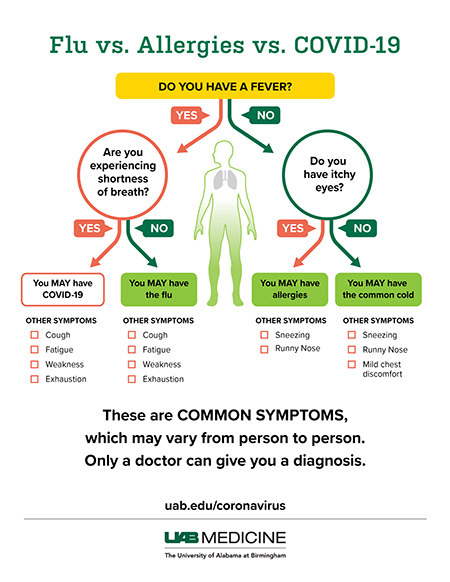As with anything else I write-- I am not a medical doctor. I am just offering general guidelines. For specific treatment decisions about your own health, talk to your doctor (if you don't have one, times like these are why they're helpful. Here's an old blog post about searching for doctors).
First off, a couple of handy charts to tease out some common symptoms. Everyone is different, but in general, these are the symptoms that help distinguish one from the other.

There are actually several good sources out there that answer this question. The CDC is one. What I write below is basically a wordier version of what they say. Because I'm not as good as editing.
Now, if you feel like you don't have Covid-19 and your health issue is something that can be managed with rest, fluids, and over the counter meds, and if you feel 0-4 on a scale of 0 to terrible, then you should do just that. Rest. Fluids. Over the counter meds to manage symptoms as needed. The end. Also, stay the fuck home.
If you think you have Covid-19 or if you feel terrible (5 or above on the scale) for other reasons, it's time to call up your doctor. Do NOT go to the emergency room. Do NOT show up to urgent care clinics. Doing either will add burden to an overwhelmed system and put you at more of a risk of contracting Covid-19. Most doctor's offices have shifted to phone calls or video visits in recent days. There are lots of "patient portals" and things you may be asked to sign up for to facilitate this process. Some might include screening questions (for Covid-19) to help you decide if and when you should call for help. You can find all those things by calling up your doctor or going directly to their clinic website if they have one. If you're already enrolled in a portal, you can schedule a visit without talking to anyone. Here's an example of one, from a health system in Michigan.
If your symptoms match with those of Covid-19 but they are not severe, you will likely not be tested. Although testing is becoming more available, many areas of the country are still behind. Testing requires a lot of resources beyond the tests, like time, personnel, and protective equipment. Unfortunately, an overwhelmed system does not have enough of any of those to spare. It's unfair. But it's American in 2020. So even if you have Covid-19, you may not be tested. Stay home. Isolate yourself from everyone, including those you live with, until you get better (better = until you have x number of symptom free days). If your conditions change according to your assessment, contact your doctor immediately. It's important for people with mild cases of Covid-19 to not just stay home but also isolate from everyone, including those in your household, because, I don't know if you know this, but Covid-19 is a novel disease. It's highly contagious. Not infecting other people means lowering the number of cases that may stress the health system.
(What if you don't have a doctor? That gets a little harder. If you have health insurance, I'd find a primary care practice that can take you. Or call an urgent care clinic that you have access to. Whatever you do, do not show up to the emergency room unless you're actively dying. Always call ahead.)
No comments:
Post a Comment